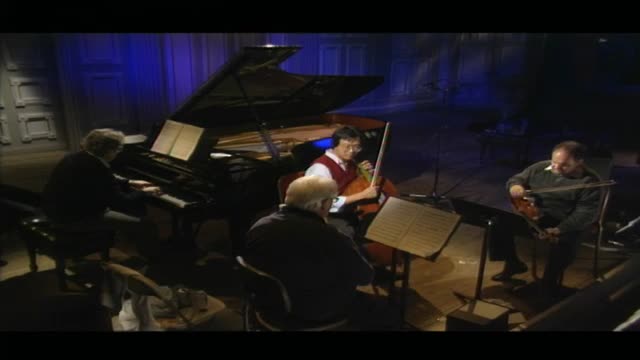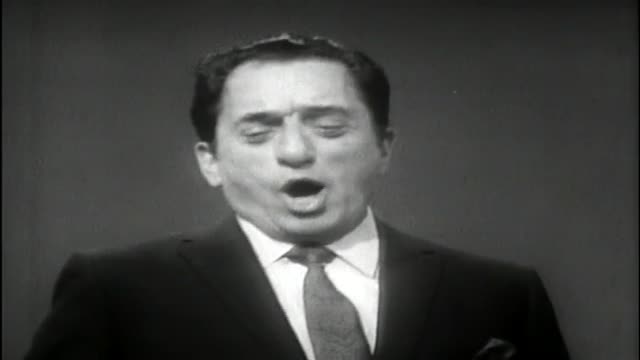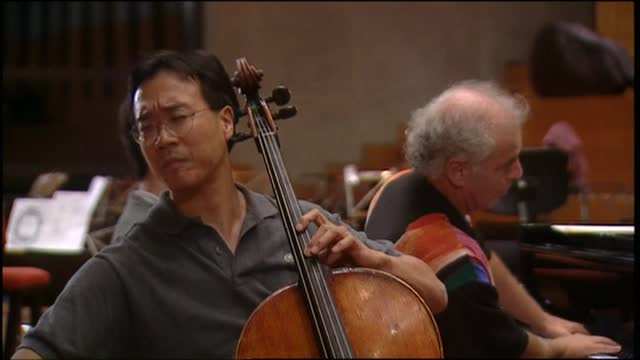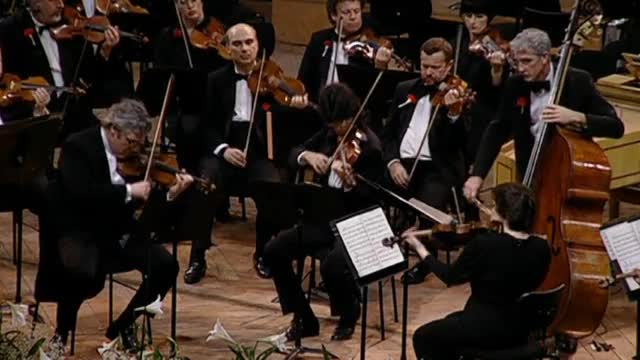Isaac Stern was born to a Jewish family in the Ukraine, but was taken to San Francisco when he was a year old and his education took place exclusively in the USA. He had some violin lessons with Louis Persinger (who was by then prominent largely because of his pupil Menuhin) and later with Naoum Blinder, whom he credited with bringing him to musical and technical self-reliance. Blinder’s Russian heritage was influential in America, where the Russian school had been the predominant fashion since the 1920s (partly through the influence of Leopold Auer). Even after making highly successful debut appearances in San Francisco and New York, Stern put himself through two more years of serious study before he was satisfied that he had attained sufficient artistic maturity to be independent.
From 1948 onwards Stern performed regularly around the world (although he refused ever to play in Germany, as a protest against the Nazi regime). He cultivated an excellent relationship with the state of Israel, where he worked hard to raise the profile and standards of music making, establishing the Mishkenot Cultural Centre and Jerusalem Music Centre, as well as supporting the America–Israel Cultural Foundation, which helps young Israeli artists financially in their studies. Itzhak Perlman, Pinchas Zukerman, Miriam Fried, Shlomo Mintz and Gil Shaham are amongst those to have benefited.
Creative in his programming, Stern moved away from standard repertoire lists. He was no advocate of showmanship, saying ‘use the violin to make music, never […] use music just to play the violin.’ Representing Stern’s artistry is a difficult task within the confines of this book, since he
recorded practically all of the violin’s literature in a fifty-year association with Sony Classical and its predecessors. Accordingly, he was awarded the first ‘Artist Laureate’ honour by the company in 1985 and a forty-four-disc collection of his recordings for them was released ten years later. As well as concert and recording activity, Stern was known for his film-making contributions, including the soundtrack for Fiddler on the Roof.
Although he began recording in the 1940s, Stern’s work is represented here first by a number of recordings made at the height of his powers in the 1950s to 1970s. This includes a fiery and impetuous performance of Sibelius’s Violin Concerto (1950) under Sir Thomas Beecham. Beginning with a suitably icy soundscape, this moves through the music in a way that sounds a little unfamiliar to modern ears. Stern’s playing is fleet, keeping up the blistering pace, but relaxes in an expansive and soulful slow movement in which his bitter-sweet tone (with a relatively narrow vibrato and a slightly gritty approach) is well displayed, garnished by a few controlled portamenti. The finale sounds rather harsh on the G-string, but moves along with great urgency and febrile character. Particularly interesting here is his mastery of the long up-bow staccato.
Brahms’s Double Concerto with Leonard Rose (1954) is equally characterful, the two artists being particularly well-matched in tone and Walter taking all movements at a refreshingly brisk pace. This is a ‘big picture’ understanding of the work, with a fine grasp of the length and breadth of overall phrasing. The limpid coda, with its triumphant and yet also long-breathed rhetoric, convincingly concludes a fine performance. This said, Stern reveals a trait that several ex-Persinger pupils displayed: a tendency to play somewhat sharp in higher registers (a conspicuous feature of Menuhin’s later years). Equally, Stern’s emphatic approach can become rather harsh and scratchy, which perhaps explains the perception of some that his playing was not in the first rank.
From 1964 we have the classic recording of Barber’s Violin Concerto, surely the recording by which many readers will know the work. Bernstein and Stern create a hard-edged yet romantic style here, Stern’s incisive tone particularly suited to the work’s character: great emotion and intensity within a tough exterior. This, again, is taken at a good pace throughout.
Nonetheless, not all of Stern’s performances are so successful. Partly this is a matter of his own playing style, partly too the inescapable subjectivism of our own viewpoints on his or any other artist’s work, especially as performance fashions change. Thus, Vivaldi’s G minor Double Concerto (1955) with Oistrakh (solo II) seems prohibitively quaint now, in an age more familiar with historically-informed Baroque performance; it is, though, much more successful than his heavy 1975 recording of Bach’s Double Concerto with Menuhin (Stern on the secondo solo part, with Bernstein at the harpsichord), which in places may be almost repugnant to some modern ears! The first movement, beginning with Menuhin’s solo, reveals Menuhin in the throes of his post-war decline, with scratchy and imprecise bowing, and, although Stern’s playing is much better tonally, neither violinist creates much excitement, in spite of some stentorian forms of accentuation. A 1971 performance of Webern’s 4 Pieces with Charles Rosen is much more enjoyable, with plenty of drama and excitement, although the sound is marred by being too closely recorded.
Stern was one of the great figures of his time and although some of his later work leaves something to be desired his earlier recordings – including the fine Sibelius, Brahms and Barber performances here – deserve the highest praise.
© Naxos Rights International Ltd. — David Milsom (A–Z of String Players, Naxos 8.558081-84)
| Title | |
| BRAHMS, J.: Piano Quartets Nos. 1 and 2 (Stern, Laredo, Ma, Bobker) | |

|
BRAHMS, J.: Piano Quartets Nos. 1 and 2 (Stern, Laredo, Ma, Bobker)
Composer:
Brahms, Johannes
Artists:
Ax, Emanuel -- Laredo, Jaime -- Ma, Yo-Yo -- Stern, Isaac
Label/Producer: C Major |
| CLASSIC ARCHIVE: Jan Peerce - If I Were a Rich Man | |

|
CLASSIC ARCHIVE: Jan Peerce - If I Were a Rich Man
Artists:
Peerce, Jan -- Stern, Isaac
Label/Producer: Ideale Audience |
| CLASSIC YO-YO MA (Classical Documentary, 2001) | |

|
CLASSIC YO-YO MA (Classical Documentary, 2001)
Composers:
Bach, Johann Sebastian -- Dvorak, Antonin -- Piazzolla, Astor -- Tchaikovsky, Pyotr Il'yich
Artists:
Amsterdam Baroque Orchestra -- Ax, Emanuel -- Barenboim, Daniel -- Boston Symphony Orchestra -- Koopman, Ton -- Ma, Yo-Yo -- McFerrin, Bobby -- Ozawa, Seiji -- St. Petersburg Philharmonic Orchestra -- Stern, Isaac -- Tan, Dun -- Temirkanov, Yuri
Label/Producer: EuroArts |
| ISRAEL PHILHARMONIC ORCHESTRA 60TH ANNIVERSARY GALA CONCERT | |

|
ISRAEL PHILHARMONIC ORCHESTRA 60TH ANNIVERSARY GALA CONCERT
Composers:
Bach, Johann Sebastian -- Brahms, Johannes -- Halvorsen, Johan -- Mozart, Wolfgang Amadeus -- Vivaldi, Antonio -- Weber, Carl Maria von
Artists:
Barenboim, Daniel -- Breuer, Menahem -- Israel Philharmonic Orchestra -- Mehta, Zubin -- Mintz, Shlomo -- Perlman, Itzhak -- Shaham, Gil -- Shamai, Ariel -- Stern, Isaac -- Vengerov, Maxim -- Zukerman, Pinchas
Label/Producer: EuroArts |
